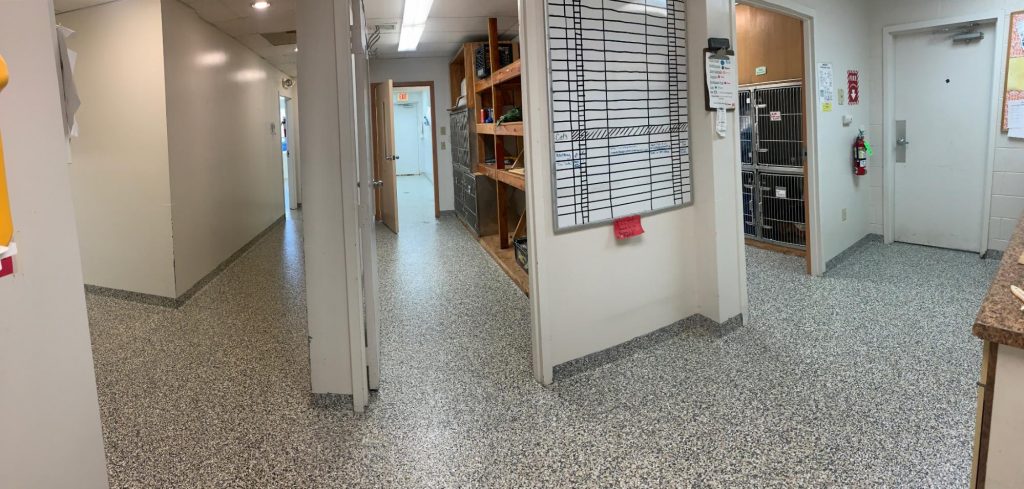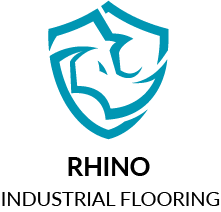
In various solutions for veterinary environments, including farms, animal sanctuaries, and veterinary offices, animal and veterinary flooring is essential to preserving the health and safety of the animals. These departing floorings are made to resist the particular difficulties animal habitats present, such as high foot traffic, stains, scratches, and dampness. They ensure a hygienic environment for pets and carers by providing durability, ease of cleaning, and sanitation.
With seamless installations and non-slip surfaces, these flooring solutions put animals’ welfare first by giving them a secure and comfortable area to stroll and rest. They also help to suppress the growth of fungus and bacteria, which reduces the risk of infection in animals.
With technological improvements, numerous solutions are available, such as rubber floors, epoxy coatings, and bactericidal surfaces, each tailored to specific demands and tastes. Proper installation and care of animal and veterinary flooring guarantees its longevity and effectiveness in improving animal health and well-being.
Importance of Animal and Veterinary Flooring
Flooring for animals and veterinarians is essential because it guarantees animals well-being and security in various environments. These locations, which range from farms and animal shelters to veterinary clinics, are humming with activity, and the flooring needs to keep up.
Think about all the dampness, scratches, and foot traffic regular flooring would not survive! Specialized animal flooring can help with it. Not only is it easy to clean, but it’s designed tough to face all those problems. It’s also all about maintaining hygiene. For an animal to flourish, their environment must be safe, clean, and well-floored.
Non-slip surfaces are very important, particularly for animals who tend to slide or slip, not to mention the flawless installations no gaps where dirt and bacteria may hide. Animals may stroll and sleep comfortably on the correct flooring without fear of slipping and getting wounded. The worst part is that this flooring lowers the chance of diseases by warding off bacteria and fungi. Thus, it’s about increasing animal health and welfare as much as durability.
Types of Animal and veterinary Flooring
Epoxy Flooring
Epoxy flooring is comparable to the superhero of veterinary and animal flooring. It’s smooth, resilient, and incredibly clean. Spills occur frequently in animal hospitals and veterinary clinics. Well, there is no chance of spills when epoxy flooring is used!
Because of its non-porous surface, cleaning is easy because stains, chemicals, and moisture are repelled. It also takes a lot of foot traffic without breaking a sweat because it is incredibly resilient. This flooring preferred by the medical and healthcare industries sanitation and hygiene are key.
Epoxy flooring is excellent in operating and exam rooms where hygiene is paramount. Its flawless surface prevents microorganisms from hiding, and because of its chemical resistance, it can withstand all disinfectants without suffering damage. Consequently, epoxy flooring is the best option for maintaining hygienic and secure environments for people and animals.
Features Epoxy Flooring offers
- Spills and messes wipe right up, keeping the space tidy.
- Handles heavy foot traffic and animal activity without wearing down.
- Requires professional installation, which can take time to complete and may disrupt operations.
- Can withstand harsh cleaning chemicals without damage.
- There are no cracks or crevices for hiding dirt and germs, enhancing sanitation.
- Animals are not as comfortable to walk or rest on softer options.
- Installation can be pricey compared to other flooring types.
Concrete flooring
Concrete flooring is a rugged, reliable option for animal and veterinary settings. It’s robust, long-lasting, and equipped to withstand any abuse that animals may inflict, much like the workhorse of flooring. Concrete is a strong and effective option for veterinary and animal flooring. It is long-lasting, resilient, and simple to clean.
Concrete can withstand heat well in areas where animals can wander, such as barns or outdoor spaces. You may proceed without any issues if you hose it down. It also costs less than other solutions, so you’ll save a lot of money.
Its smooth surface facilitates easy sanitization, an important feature in operating and exam rooms. It is resilient enough to tolerate frequent washing and heavy machinery. Concrete flooring is a good option for keeping things hygienic and functional in animal and medical environments.
Features Concrete Flooring offers
- Concrete flooring is frequently less expensive than alternative flooring options, saving money.
- It can be utilized in various veterinary and animal care situations because it can be employed indoors and outdoors.
- Concrete floors can function dependably for many years if they are properly maintained.
- It is more cosy for pets to lie down or stroll on than alternatives with softer flooring.
- Concrete floors are allowed to crack over time, allowing bacteria and grime to grow.
- Wet concrete surfaces can be slick, which puts people and animals at risk of slipping.
Antimicrobial Flooring
Antimicrobial flooring is like having a secret weapon against pathogens in veterinary and animal settings. It’s made to keep germs, fungus, and other bad guys at bay so that people and animals can live in a safer and cleaner environment. Antimicrobial flooring stands up to the plate in exam rooms and surgical rooms where sanitation is crucial.
Its unique qualities lower the risk of infections and diseases by preventing the formation of dangerous germs. It is also quite simple to clean and sanitize, which makes it a great option for keeping high-traffic areas clean.
prevention is key. Antimicrobial flooring helps create a healthier environment for patients, staff, and pet friends by halting the transmission of germs before they can cause harm.
Features antimicrobial Flooring offers
- Antimicrobial flooring improves human and animal health by preventing pathogen spread.
- The smooth surface saves time and effort when cleaning and sanitizing.
- Antimicrobial qualities endure throughout time and continue to offer defense against infections.
- Antimicrobial flooring is perfect for busy veterinary clinics and animal care facilities because of its strength and resilience to wear.
- Installing antimicrobial flooring could be more costly than installing conventional flooring.
- With antimicrobial flooring, fewer options can be available regarding color and design.
- Ensuring the efficiency of antibacterial characteristics requires correct installation.
Anti Slip flooring
Anti slip flooring is invaluable in veterinary and animal environments because. It gives both animals and carers a stable base mishaps occur in busy locations like veterinary clinics or shelters, but slip resistant flooring prevents slips and falls. Its textured surface provides excellent traction, guaranteeing a secure stance even on damp or muddy terrain.
This flooring puts safety first, making it an excellent choice for settings with animals. Anti slip flooring keeps everyone solid on their feet, whether a puppy is bounding around the clinic excitedly or a veterinarian is hurrying to save an injured animal.
Because it is simple to maintain and clean, it is a hygienic option for settings where tidiness is essential. Therefore, Antislip flooring is the best option for making a safe and secure room for pets and carers.
Features anti slip Flooring offers
- Anti slip flooring lowers the possibility of trips and falls, protecting pets and carers.
- Its rough surface offers superior traction on slippery or damp terrain.
- Anti slip flooring reduces the likelihood of accidents, which helps shield people and animals from harm.
- It is best suited for high-traffic places like congested veterinarian offices and animal care facilities.
- Anti slip flooring promotes a sanitary environment and is simple to clean and maintain.
- Anti slip flooring may give fewer color and pattern options.
- Anti slip flooring installation may be more expensive than installing other types of flooring.
- Some animals may find the rough surface difficult to walk on.
Benefits of Animal & Veterinary Flooring
Durable
When it comes to animal and veterinary flooring, durability is the name of the game. These floors are like the superheroes of the flooring world, tough enough to handle, durable enough to wear and tear whatever the animal kingdom throws at them. They can take a beating from claws to hooves without showing a scratch.
Hygiene
Regarding animal and veterinary flooring, hygiene is the real MVP. These floors are like your clean team, keeping bacteria and fungi in check for a healthier environment. In places bustling with animals, like vet clinics or shelters, germs can run wild.
Moisture Resistance
These floors are like moisture superheroes, ready to tackle whatever gets thrown their way. With their moisture and slip resistance properties, they stay fresh and clean, no matter what. That means you can say goodbye to soggy floors and hello to a dry, odor-free environment.
Longevity
Longevity is a key perk when it comes to animal and veterinary flooring. These floors are built to last. We’re talking about floors that can withstand the test of time. No more worrying about constant repairs or replacements.
Animals Welfare
One of the biggest benefits of animal and veterinary flooring is how it contributes to animal welfare. Animals spend much time on the floor, whether walking, lounging, or resting. So, having the right flooring is crucial for their comfort and well-being.
FAQ’s
Which animal species stand to gain from special flooring?
All kinds of animals, including pets, cattle, and unfamiliar animals, benefit from specialized flooring. It’s very helpful in farms, zoos, animal safeguards, and veterinary clinics.
How can I pick the ideal animal facility or veterinary clinic flooring?
Think about animal comfort, cleaning convenience, hygienic procedures, and lifespan. Look at your institution’s particular needs and consult flooring experts to choose the best course of action.
In what range does specialized flooring fall?
Specialized flooring might cost different amounts depending on the type of flooring and the area that has to be covered. Even though specialist flooring may cost more initially to install than regular flooring, in the long run, it is usually cheaper because of its durability and low maintenance requirements.
Is it possible to stop the transmission of illnesses among animals with specific flooring?
Indeed, many specialty flooring options including antimicrobial flooring are designed to inhibit the growth of germs and fungus, therefore reducing the likelihood of animal illnesses.
How can specialized flooring be kept clean and maintained?
Routine sweeping, mopping, and disinfection will be done to maintain the cleanliness of most specialty flooring. See the manufacturer’s instructions for comprehensive cleaning practices that ensure longevity and best performance.
Conclusion
Many benefits come with specialist animal and veterinary flooring, including comfort, safety, hygiene, and longevity for both animals and carers. Choosing the right flooring for your veterinarian’s office or animal facility can help you establish a hygienic, secure, and comfortable environment that benefits both human and animal health. Investing in high-quality flooring is essential for giving animals excellent care and ensuring your veterinary office’s or animal-related business’s success, regardless of the flooring you choose rubber, epoxy coatings, antimicrobial surfaces, or another kind.
